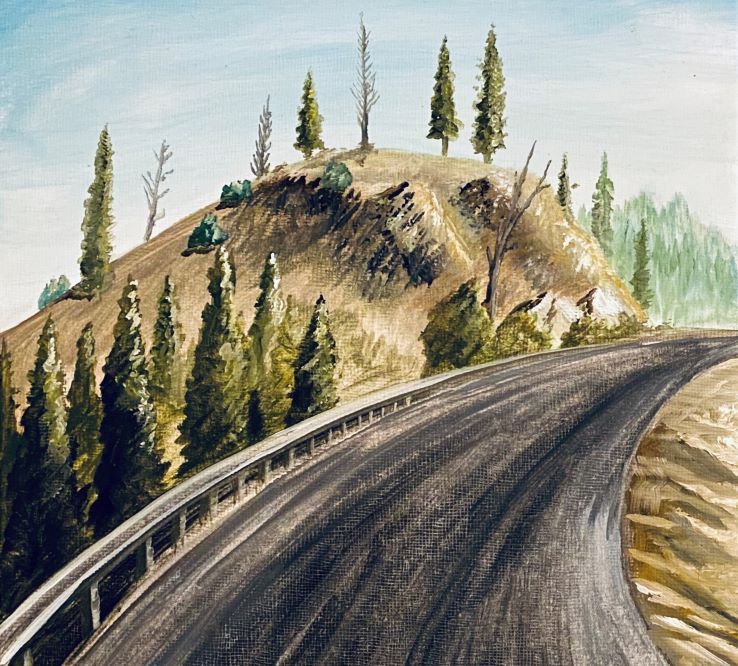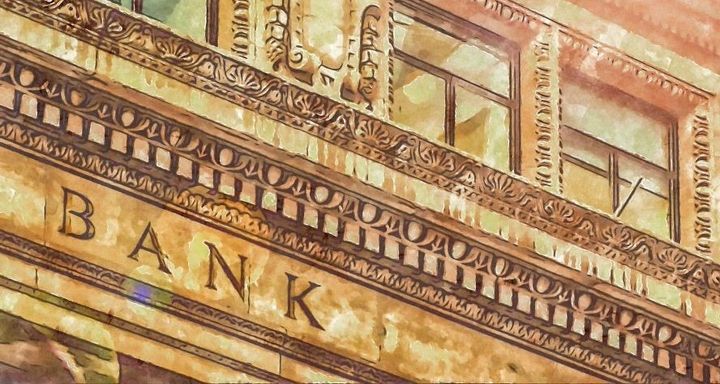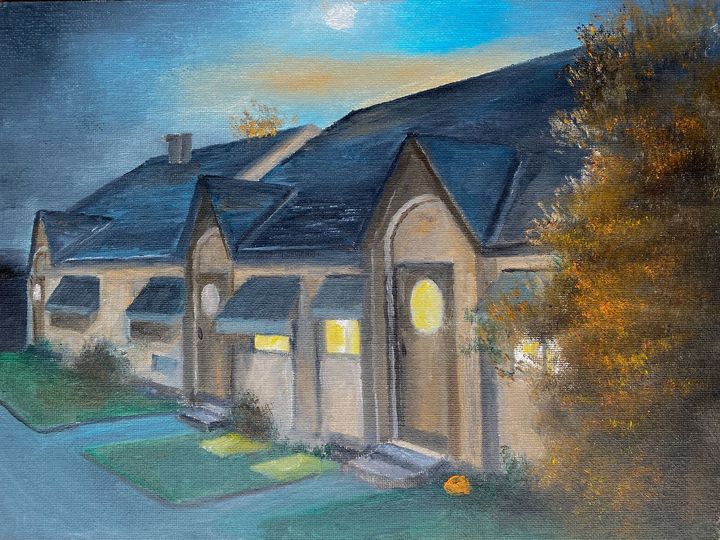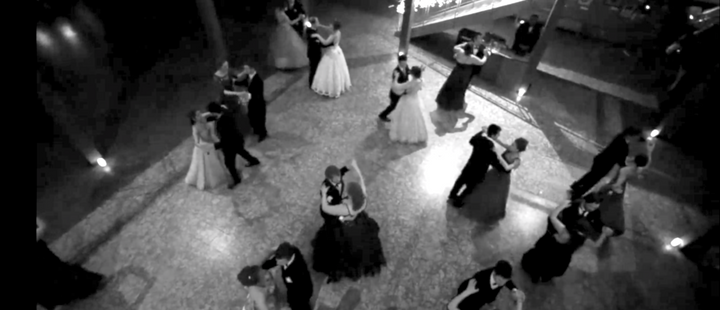Ep. I - "Brother's Keeper"
Ep. I - Tales of Flesh and Blood
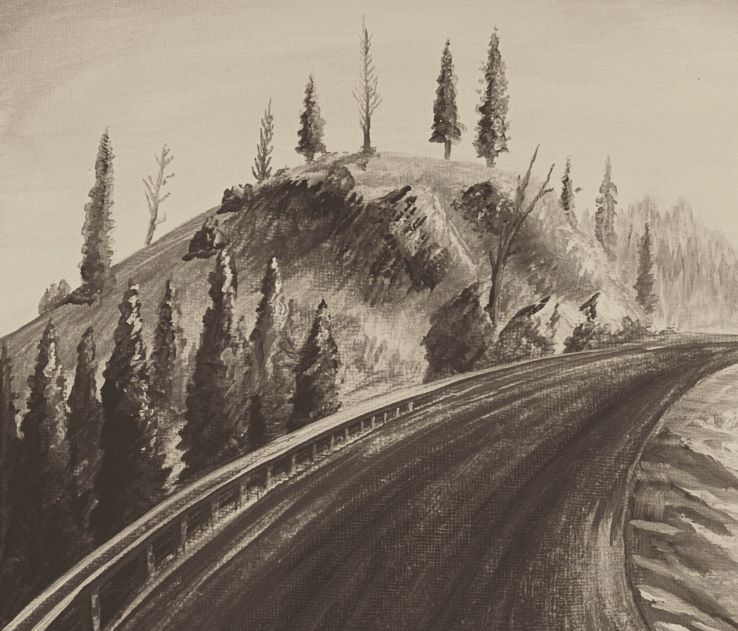
Sep. 26th, 1942
Nightfall, seventeen miles southeast of Trout Lake.
Terrell Backbone must get to Sanctuary. If he can make it there, he will be safe.
Half Yakama, half Crow, Terrell lives on the Yakama Nation reservation with his grandmother. Six days ago he'd been driving. Too fast, too recklessly, and he'd crashed into an oncoming car. The driver of the other car; a wife, and soon-to-be mother, lived.
Her unborn child did not.
Seventeen years old, Terrell Backbone's life is forfeit.
Today alone, Terrell has passed through more than twenty miles of forests, pastures, and mountains. He climbs over moss-covered rocks and crashes through steep-sided creeks, hungry and tired. Terrell's hands are scratched and scraped, his body is bruised and aching, but he cannot stop.
His breath fogs out in the cold September air; he runs a dirty hand over his close-cropped hair. The satchel on his back has only a few possessions: some clothes, a little food, and $86. His whole life and all of his savings are in the bag on his back.
The baying of hounds calls somewhere in the trees.
Behind him? How far away? He doesn't know.
If his pursuer, the woman's husband, finds him, he will kill Terrell without mercy.
Fighting the man is out of the question. Cities of refuge will shelter a man guilty of manslaughter, even of a child. Killing the man sent by the tribe to execute justice would never be defensible.
Above Terrell Backbone's head, dark clouds rumble with thunder. If it would only rain, it would hide Terrell's scent from the pursuing hounds.
Terrell scrambles atop a small, rocky hill and gasps for breath. His hips, knees, and ankles throb with pain; sweat and dirt coat his arms and face. Peering down through the gathering gloom, Terrell spies his goal.
The town of Glenwood lies just beyond a wide, green cow pasture. It is called a "Sanctuary City," but the small community is made up of farms with modest or meager crops, or herds, on parcels of land bordered by split-rail or barbed-wire fences.
The homes are almost all from before the turn of the century, ordered out of Sears & Roebucks catalogs, and share many features: two stories, painted white, and built next to barns that are even older.
Terrell Backbone knows, though it's too far to see them, that piles of stones have been set out around the town, spaced hundreds of feet apart in a huge circle. These markers divide the town of Glenwood from everywhere else, and if he can make it past them before his pursuer catches him, those simple rocks will mean the difference between life and death for Terrell Backbone.
Terrell hears the hounds once more. They're getting closer. Though his body protests, he forces himself into movement once more, stumbling, running, half-falling down the hill.
He reaches the bottom, and a rock shifts suddenly, sending him tumbling to the ground. A sharp pain in his knee overrides all the other aches, but the baying of the hounds is more important. Terrell scrambles to his feet and presses onward, limping and gasping.
He has crossed perhaps a hundred feet of open pasture. Hundreds more lie between him and safety. His body cries out for rest, for sleep, but stopping will cost him his life. Out on this wide plain, Terrell Backbone knows he'd make a tempting target for even a poor marksman armed with a rifle. Tribal law is clear on this, however; the righteous kill, signed and sealed by the Tribal Council, and delivered by knife or tomahawk, would come from the hand of the kinsman redeemer himself.
Terrell continues moving fast as his tortured leg will allow. He looks back over his shoulder for signs of his pursuer and runs over a dry irrigation ditch. Terrell feels something in his injured knee tear. Pain rips the breath from his body.
The hounds cry again, the freshness of his scent drives them to a frenzy.
Fighting tears, Terrell Backbone crawls from the ditch, dragging his leg behind him, making his way slowly towards the town. Around him, the patter of raindrops finally fall. Thunder rolls and crashes, and the rain intensifies.
Terrell's hands scramble in the slick grass, finding little traction. He sprawls face-down in the mud.
Behind him, Terrell hears the approach of booted-feet. Fear claws at his throat, but he can run no more.
The footsteps draw closer.
Terrell strips his pack off, and throws it in the direction of the pursuer.
"Take it!" he screams. "Take it all!"
The footsteps pass the small bundle. A pair of boots stop near Terrell's head.
"I'm sorry," Terrell Backbone whispers, tears and rain mingling on his face. "Do it. I'm so sorry." The last are ragged words mumbled out.
Strong hands grab him, lift him up, and force him to move forward. Terrell can't look up to meet the eyes of his pursuer, but continues to weep and cry out his guilt and sorrow.
Many halting steps later, Terrell is set down; he collapses onto the mud.
"Now what?" he asks.
After an extended silence, he looks up. There is no one around him. A few feet away, a pile of rocks marks the boundary of the Sanctuary City.
He is inside its protection.
Terrell Backbone stares shivering, teeth chattering, out into the misty night, searching. In the brief moment of a lightning flash, Terrell sees the silhouette of a man atop the last ridge before all is dark once more.
The next flash reveals the empty ridge; his pursuer gone.

Four years later.
2 miles outside White Swan
Isaiah Lopez revved his motorcycle as he crested a hill, traveling along a dirt road.
The ten-year-old machine protested the strain with increased rattling, and a slight whine, which was new and worrisome to the Bureau of Indian Affairs agent.
The wildly fluctuating dials absorbed his attention and his bike slewed over to the other side of the road just as a beat-up pickup truck crested the hill heading towards him. Isaiah's front tire wobbled dangerously, and he was barely able to wrestle his bike out of the path of the oncoming vehicle, with a well-aimed boot to the rear fender of the truck, below the wooden slats of the rails.
Despite the skill of his feet, he still earned glares and gestures from the three Yakama men inside.
Following the near-wreck, the bright red bike settled down and ran smoothly as usual.
"Usual" still left his teeth rattling though, at the end of a long ride.
The Bureau of Indian Affairs agent had been called out to the small town of White Swan, on the Yakama reservation, to investigate a murder.
Rolling foothills and hop-laden fields hemmed the road on either side, and the October sun warmed the back of his tan bomber jacket, while his curly black hair whipped in the wind.
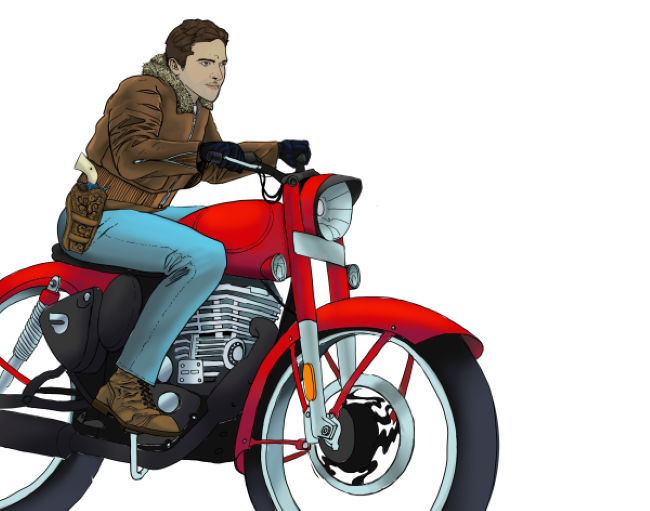
A few miles past the crossroads at Brownstown Road, Isaiah arrived at his destination.
It was one of the countless prosperous little farming communities nestled in the western foothills of the lower valley. Tidy brick houses sat at the end of a private drive, untouched by the Great Depression which had ravaged the rest of the country sixteen years before.
His bike rattled to a stop in front of a group of people, where an ambulance sat parked. Isaiah stepped off the motorcycle and moved the hat dangling at his back to his hands. Gravel crunched under his brown leather boots as he walked towards the farmers and their families.
A few questions gave him the grisly story: that morning, Jon Lookingglass was ambushed. He'd been found with the back of his head stove in and his throat cut.
One question more led him to the last house on the row: the home of the victim's widow, Muriel.
Muriel was slim and dark. Her hair was messy, and her eyes were red from crying.
Isaiah showed her his badge, "Isaiah Lopez, Bureau of Indian Affairs. I'm very sorry for your loss, ma'am."
Paltry as he knew his condolences to be, he offered them nonetheless.
She was understandably distraught, so the agent gave her a few moments to collect herself, before asking for information about her husband's death.
"There was a man from another tribe," she said. "Sam White, who came around asking for Jon the other day. We think it was him."
"You and who else?"
Muriel seemed lost in grief for a moment, and her eyes wandered sightlessly. When her answer came, it was almost trancelike, "...Jon's brother, Ethan."
"Is his brother here? May I speak with him?"
Wherever her grief had taken her, Muriel returned to the present, meeting Isaiah's eyes, "No, Ethan works at the lumberyard and isn't here."
"Did Jon know Sam White?"
"Not that I know of."
"Any idea why someone would ambush your husband and kill him?"
Muriel shook her head sadly, but not in negation, "Johnny, he could get...angry, and it got him in trouble, but last last summer he changed. He was at a pow-wow, and he played poker with some men from another tribe. One of them cheated Jon out of some money..."
She spoke with difficulty, and her voice choked with tears, "...My husband confronted him, and the man attacked, and Jon killed him in self-defense. I think this is...revenge for that. But after that, Jon stopped letting his anger get away from him like that. It was like he was a new man."
The woman gripped Isaiah's jacket sleeve, and her eyes burned with intensity, "Find him, please. Don't let him do this to anyone else's family."
It seemed she could speak no more, and she excused herself, ducking inside her house.
Muriel Lookingglass' words rang in his ears, and he found his jaw clenching in anger. He swore silently that he would find the one responsible for Jon's death.
As a BIA agent, the only reason Isaiah was called was when someone had committed a serious crime and fled the reservation. The tribe didn't have authority to arrest suspects off the reservation, and non-tribal police lacked authority on it. In order to keep the peace, the Bureau of Indian Affairs had been granted authority by both the tribes and the U.S. government to operate as a mix of U.S. marshal and bounty hunter.
According to witnesses, the suspect had left the community driving a dark blue and cream-colored two-door coupe.
Isaiah walked back along the row of houses to leave and almost collided with a blonde woman walking around the corner.
She was dressed in professional attire, with a large, sky blue hat atop her blonde tresses, green-blue eyes and heart-shaped face.
These details were largely overshadowed by the hat she wore upon her head. It looked like it had been modeled after a nurse's cap from the war, then expanded upon until it had become something Napoleon Bonaparte might have envied.
The rest of her attire was more reasonable; a waist-length grey jacket with rows of buttons up the front, belted and closed over a black, knee-length dress. Her shoes were black heels with straps around the ankles. White mesh gloves covered her hands and a black leather satchel was slung over one shoulder.
The woman noted his badge, and lit up grinning.
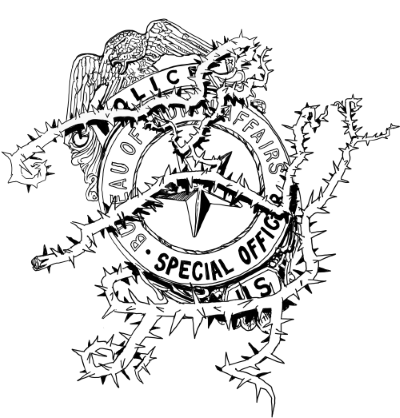
"Hello!" she said, offering a gloved hand in greeting. "Juliet Jones."
In light of the day's events, her exuberance set Isaiah's teeth on edge, and her following statement confirmed to him that his reaction had good reason.
"I'm a reporter with the Rain Shadow Report."
The only response Isaiah could give was a sickly, "Ah."
But good breeding came to the fore, and his reply was brief and matter-of-fact, "Isaiah Lopez, Bureau of Indian Affairs."
"What can you tell me about the case, Isaiah?"
Her familiarity was another offense to him, and his response was curt, "Nothing."
He'd often said that if there's one sure way to spoil a case, it's to have a newshound on it.
Juliet's friendly smile slipped a little, and she hauled it back up with slight effort, "Surely there's something you can share..."
Isaiah moved to step past her, throwing out a last comment, "I never learned to share."
The Bureau agent reached his bike and stooped down, making numerous adjustments to the controls and levers on the machine. While Juliet stood nearby, he mounted the motorcycle and tried to kick start it.
And tried to kick start it.
His third attempt was interrupted by Juliet's voice, "Did you remember to put gas in it?"
She remained in the same pose, purse in hand. Her face wore the look of a school teacher helping a particularly slow student. Isaiah's face darkened in a scowl at her words, and he climbed down into the wet grass to fiddle with the machinery under his bike.
"Propane isn't gasoline, you know," she continued helpfully. "You can't run a motorbike on propane."
Isaiah rose to his feet, wiping at the mud and gravel on his clothes and glared at Juliet, "Does Tylenol pay you to give people headaches?"
Her eyes widened before she responded sweetly, "Does Helen Keller pick out your clothes for you?"
Isaiah gave an inarticulate growl and kicked the starter savagely, finally enticing it to life. A few moments later, both the motorcycle and its rider roared out onto the dirt road.
He was still fuming when he arrived at a gas station a few miles down the road, and spoke to the attendant there. An hour before, a dark blue and cream coupe had come in.
Its owner had matched Sam White's description and purchased a full tank of gas. According to the gas station attendant, the driver had been quiet and withdrawn, but not rushed or hurried.
A few minutes later, Isaiah rattled up to the Bureau of Indian Affairs office. It was a small, two-room office set up in the Toppenish Train depot.
Isaiah pushed the smoked glass door open, hat in hand, and called to his partner, "Hey Anthony, do you ha–"
His words ran out like they owed two months of back rent.
Sitting on one of the cluttered desks with ankles crossed, the lady reporter was chatting up Isaiah's partner.
Anthony was a tall, lean man whose tie was perpetually askew. He could manage to have a five o'clock shadow by 8 a.m.
At Isaiah's entrance, the woman looked up and graced him with an infernal smile that Isaiah would come to realize was her trademark.
"'Bout time you showed up," she said.
"Ophelia, was it?"
"Juliet," she responded.
Isaiah nodded at her correction, "Right, Juliet. Knew it was something stupid and pretentious."
The last was muttered as an aside, which if she had heard, she elected not to notice, asking him a question instead, "You ready to talk?"
He thought for a moment, and his shoulders slumped in defeat.
"Fine," he said. "Since there's no way of getting rid of you, we can talk on the way to the suspect's car. It was found abandoned a few blocks away."
He gestured out the window as he spoke, and her eyes followed the direction his arm pointed. Of course she couldn't see anything from there, but Juliet's eyes lit up, and she hopped off the desk, grabbing her coat and handbag.
He waited back, holding the large door for her as she stepped out.
Once she was clear of the threshold, Isaiah grabbed a nearby chair, slammed the door closed, and wedged the chair under the door's handle. Isaiah grunted in satisfaction, ignoring the outraged shriek and subsequent pounding at the front door.
"Every inch a lady, until her will gets crossed," he muttered, and then went to the coffee pot and poured a cup of coffee.
He returned to his desk, sat down, and leaned back with his feet propped up.
Anthony caught the younger man's eye; one eyebrow raised and offered a dry, "She certainly is persistent."
The senior agent had to speak over the high-pitched, muffled yelling that continued from outside.
Isaiah nodded, "Yeah, like athlete's foot."
"Why is being disliked so important to you, especially by a pretty female of, shall we say, marriageable age?"
The last was said in an affected accent, an imaginary teacup held in Anthony's long fingers, as he continued, "Whereas I refuse to accept any woman that would have such bad taste as to accept me. You should stop being so picky."
Isaiah waved away his comment, "Who'd want to be liked by an over-enthusiastic puppy of a girl?"
Anthony grinned widely, showing large, white teeth.
"Oh to return to a simpler time," he said, throwing his arm over his eyes theatrically, "when a wife was judged on how much wood she could chop."
Isaiah grunted sourly, but gave no other response.
The taller man noted Isaiah's mood and Anthony's grin grew wider still, "Ah. Another tragedy that needs Isaiah Lopez to set it right?"
Isaiah favored his partner with another glower, still saying nothing.
"You know," Anthony admonished, wagging a finger, "that overdeveloped sense of justice of yours is going to get you into trouble someday."
Isaiah shrugged, enjoying the moment of relative peace for a little while, before he picked up the phone to call the BIA offices of nearby tribes.
By the time Isaiah finished his second phone call, the woman reporter had apparently given up and wandered off somewhere.
His third call, to the Umatilla reservation office, paid off. The agent on the phone read quickly through the registered inhabitants and confirmed that they had a Samuel White.
Isaiah finished his phone call, grabbed his hat off a peg, and slipped a pair of handcuffs into his pocket before bolting out the door for his motorcycle. Outside, thick rain clouds had gathered, and the wind had turned icy.
Isaiah was glad of his thick bomber's jacket as he labored to start his motorcycle. It was often finicky in bad weather, so he dismounted the bike and reached into a saddlebag for a wrench.
Taking it apart to find out what was wrong this time would cost him a delay he could scarcely afford.
Wrench still in hand, his frustration grew as he looked up and noticed Juliet Jones, sitting in an olive green, four-door sedan. The journalist was parked across the road underneath a street lamp.
She watched with a look of interest on her face as he fought with the recalcitrant machine. After a few moments of observation, she stepped out of her car and walked over, stopping a few feet away.
"You know, I need a lead, and it looks like you need a ride? How about we help each other out?"
Isaiah contemplated the long, cold ride out to the Umatilla reservation once he finally got the bike fixed. Overhead, the clouds had grown dark and gray, and tiny raindrops began falling on the sidewalk around them.
The Bureau of Indian Affairs agent sighed in resignation, "Alright. Let's go."
Rain pelted the windshield of her car as they drove over the rolling hills of southern Yakima county and into Klickitat county. Juliet steered the car through the steely downpour, her questions just as unrelenting.
One of her first had been about the nature of his job, and he grudgingly responded in clipped tones at first, then slowly warmed as he spoke.
"The Indian reservation doesn't have a police force. The law is enforced at a community level, and only high crimes are judged by the Tribal Council.
Primarily, I work as a detective. I investigate crimes on the reservation. I arrest the people responsible, and I present evidence of their guilt to the tribe. Based on the strength of the evidence I provide, the tribe decides to acquit or convict, and render the punishment.
The other side of my job is to pursue people who commit crimes on the reservation and flee off of it. The BIA works similarly to the U.S. Marshals, arresting and returning fugitives to the tribe for justice."
Following that explanation, it seemed Juliet had finally run out of questions, and silence fell inside the cab of her car.
The lady reporter looked to Isaiah expectantly. It seemed she was waiting for a question from him.
"How come you write for a rag like the Rain Shadow, and not a legitimate newspaper?"
His question was harsher than he intended, but her laugh filled the car.
"By 'legitimate newspaper,'" she clarified, her eyes twinkling, "you mean Yakima's own 'Seattle-Times-Light?' Well, it turns out that they're immensely interested in printing every viewpoint, just as long as it completely agrees with their own."
"Ah," he said, and turned to stare out the window at the wet hills around them.
A few short moments later, his thoughts were interrupted by her voice.
"Juliet Jones isn't my real name," she offered.
Isaiah turned to look at her, waiting for clarification. When it didn't come right away, he started to look towards the window again, but was interrupted.
"I think that it has a kind of larger-than-life feel, don't you?" she said. "Like 'Lois Lane' or 'Wonder Woman,' or –"
"Or Donald Duck," Isaiah offered.
This earned him a teasing glare from the lady reporter, "...Anyway, it looks better in print than 'Erin Duncan.'"
"'Erin Duncan...'" Isaiah pondered the name, and for a moment, in the failing light of day, brown eyes met blue-green.
"You know, you're right," he said. "After some thought, Juliet Jones is better."
The lady reporter rolled her eyes and responded with a grin, "When you give your two-cents, I bet you get change back."
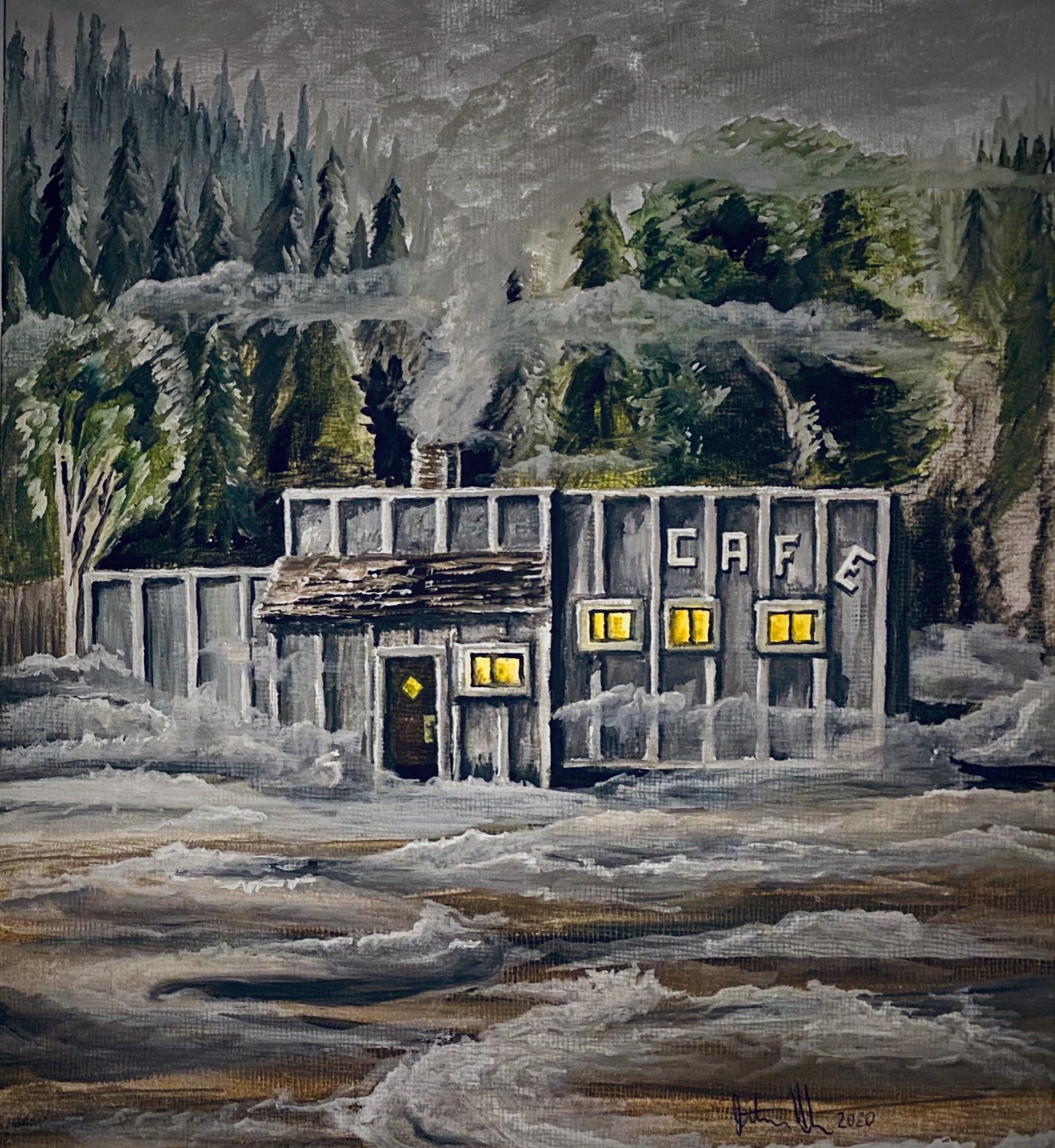
Isaiah continued staring out the side of the car, and as they passed a roadhouse on highway 97, his attention was caught by a beat-up truck with wood-slat rails parked in the empty end of the parking lot.
The bureau agent sat up straight in his seat, "Go back!"
Juliet heeled over to the shoulder, turned around, and raced back to the roadhouse.
The restaurant and bar had wood siding and shingle roofing. Wood smoke from a chimney drifted around the place, hanging low in the cold, wet air.
A sudden thought occurred to Juliet.
"They might not let us in," she said, angling her car for a spot near the front door.
Isaiah looked out the window, his eyes searching the parking lot, "Why? Have they already met you?"
She rolled her eyes, "I mean, they might not let you in, agent Lopez."
Juliet waved her hand at his entire person, encompassing his dark hair, dark eyes, and complexion. The Indian Affairs agent looked away from the window briefly in understanding.
"Oh, they don't care who comes in, as long as they have money."
Isaiah's eyes widened suddenly; one of the other cars parked near the door was the dark-blue and cream, two-door coupe.
"That's the suspect's car!"
Juliet parked a few spaces away and killed the engine, while Isaiah reached into his pocket and pulled out a pair of handcuffs.
They jumped out of her car as the rain pelted around them and scrambled towards the front door, shoulders hunched against the rain. Almost to the door, Isaiah and Juliet heard raised voices from around the side of the building, followed by a man's scream.
"Call the sheriff!" Isaiah yelled, charging around the side of the building.
Behind the roadhouse, Isaiah found three Yakama men harassing a Native man who could only be Sam White.
One of Sam's arms was pinned by a Yakama man in worn jeans, a work shirt, and a brown leather vest. A husky kid of sixteen or seventeen years held Sam's other arm. The third man was the tallest, and he stood in front of them. His mouth bore a scar which pulled his lip up in a permanent sneer. In his hand was a bloody knife, which had cut a shallow gash down Sam White's face.
Sam was young, only twenty years old, and plainly terrified. Tall and lean, he had a braided ponytail tucked into a rumpled charcoal-colored pinstriped suit. Around his neck, Sam wore a three-strand, white bead necklace.
"Bureau of Indian Affairs!" Isaiah yelled out, breaking the tableau.
Cut-Mouth's face was a mask of rage and sorrow. He waved his knife threateningly at the agent, before yelling back, "He killed Johnny! Now we're gonna do the same to him!"
Cut-Mouth turned back to his victim. With a smooth, swift motion his knife blade rammed deep into Sam's gut.
Ignoring the gun at his belt, Isaiah sprinted forward, gripping the handcuffs in his right hand like brass knuckles. The BIA agent reached the knife-wielding Cut-Mouth, and hammered the steel cuffs into his scarred cheek, which sent the man reeling, dazed.
Isaiah was a continuous blur of motion, spinning back to Leather Vest. Agent Lopez's hand whipped out low, the steel handcuffs intersecting Leather Vest's jeans below his belt, quickly dropping his opponent.
Before Leather Vest's knees even touched gravel, Isaiah was on top of the husky youth, tackling him likewise to the ground. Isaiah landed three hard, swift punches to the kid's face, then rolled to his feet. The BIA agent expected to be rushed by one or more of the men, but Leather Vest and Husky were still on the ground, and Cut-Mouth had a gash on his cheek from the handcuffs.
In the rush of the moment, everyone had forgotten Sam White who wrenched the knife from his gut, causing blood to soak through his suit jacket. Cut-Mouth's attention was on Isaiah, and the scarred man failed to notice Sam's attack until it was too late.
Sam slashed wildly at Cut-Mouth, bright arterial spray indicating he'd hit something vital. Cut-Mouth sank to the ground. Sam White dropped the weapon, running for the corner of the building, holding his wounded side.
Isaiah rushed to the fallen man's side, compressing the wound and staunching the blood with a handkerchief. Leather Vest and the youth regained their feet and took off after the fleeing Sam. Over the hushing of the falling rain, Isaiah heard the sounds of spraying gravel and roaring engines that quickly faded into the distance.
When Juliet arrived at the scene, patrons and roadhouse employees had joined her. Though Cut-Mouth had lost consciousness, Isaiah had been able to stop the bleeding. Most likely, the man would survive the wait for an ambulance and trip to the hospital. I.D. in his wallet identified him as Ethan Lookingglass, Jon Lookingglass's brother.
Juliet stooped down and retrieved the dropped knife which had almost killed him and might still kill Sam White. It had a wide, leaf-shaped blade. The handle was thick and square and made of bone or antler, and lacked a hand-guard. Around the hilt was a strip of linen, which bore a short, two-word inscription in a foreign language:
Náymu pápinsh.
The second line in English, read:
Whoso sheddeth man's blood, by man shall his blood be shed.
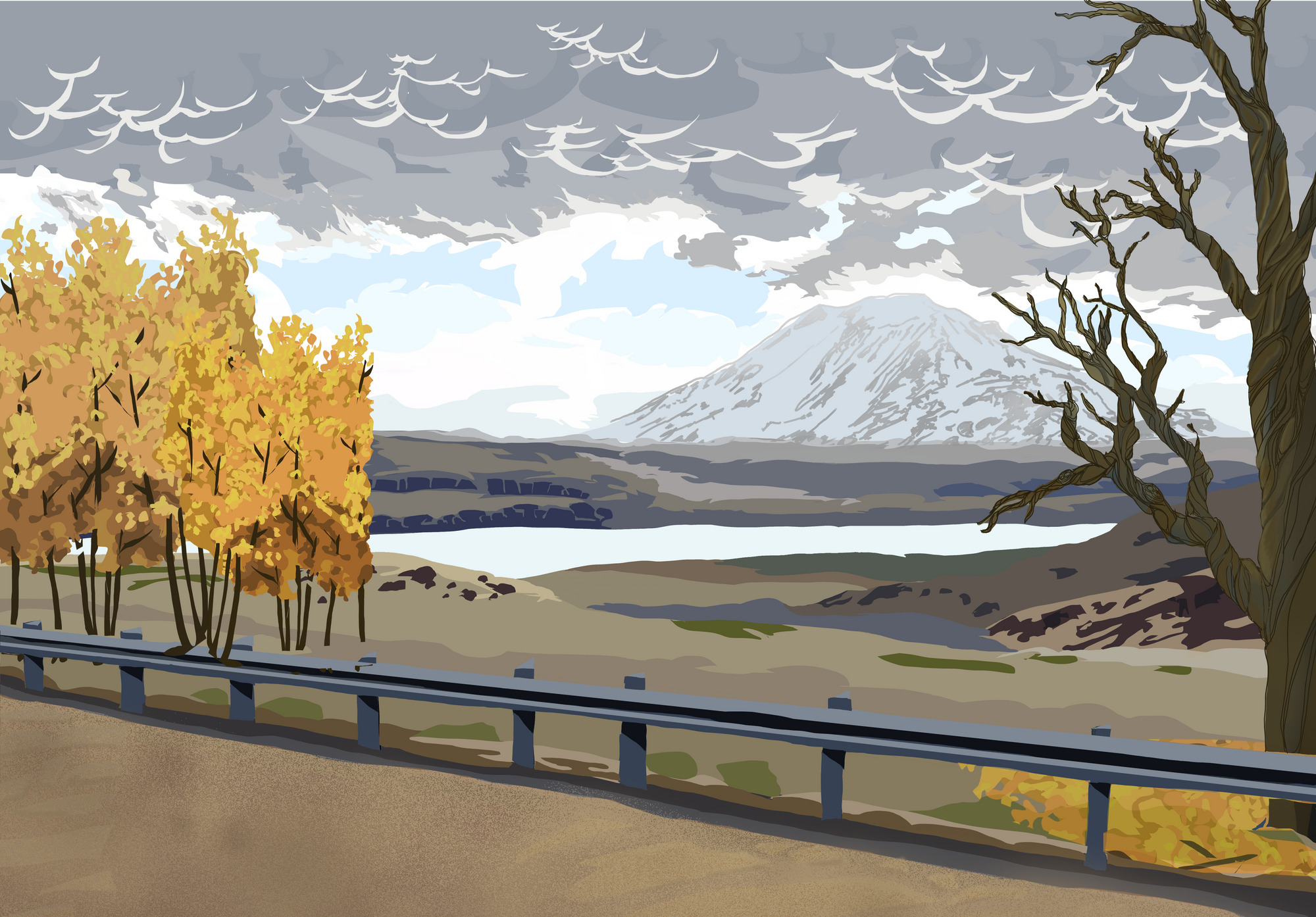
Leaving the man in the care of the roadhouse staff, Isaiah and Juliet got on the road once more, continuing south.
Juliet drove while he read the inscription on the linen strip, which had bound the hilt of Ethan Lookingglass's knife. The lady reporter took her eyes of the road briefly to look at Isaiah.
"Any idea what that means?" she asked. "I think that last part's from the Bible."
Isaiah nodded, still looking at the blood-stained cloth, "Yeah, book of Genesis. The other words are Sehaptin. It's the language of the Yakama. It says 'Kinsman' and 'murder.'"
Juliet nodded in thought, "So it's revenge for killing Jon Lookingglass, and they wanted to send a message?"
Isaiah shook his head, "No. They're not sending a message, they're carrying one. Or at least would be, if it had been approved by the tribe."
She blinked rapidly for a few moments, "Yeah, that almost made completely no sense at all."
"How much do you know about biblical law?"
Juliet's brow wrinkled in confusion, "Like the Ten Commandments, and the sacrificing, and things?"
"Yeah, kind of. Without going into the full history or theology of it, the Yakama Reservation, the Colville Reservation, and the Umatilla Reservation all practice biblical law. The law that's important at the moment is 'Thou shalt not murder.'"
"You mean though shalt not kill."
"Though shalt not murder – pay attention. Under biblical law, if there's a wrongful death, even what we'd call manslaughter, it's considered murder by the tribe. In that case, the Tribal Council issues a ceremonial knife to the victim's 'kinsman redeemer.' The weapon is stamped and sealed by the tribe, showing that they've ruled on the case and rendered judgement, thus guaranteeing the safety of the kinsman redeemer as a sanctioned executioner. This knife, though, has no seal, so Ethan and the other two men probably acted without the consent of their tribe."
"So where does Sam go?" she asked. "He's wounded and chased by people that want to kill him."
Isaiah reached into the interior pocket of his jacket, pulling out a creased and wrinkled map of the state. After a few moments, Isaiah tapped a small legend at the southeastern end of Yakima county, labelled "Glenwood."
Isaiah looked up, "He's headed for Sanctuary."
They drove down highway 97 a few miles, turning into the town of Goldendale. Juliet drove them down the main street and out the other side to the highway, continuing west as night fell.
"Sanctuary Cities," Isaiah explained, "are for people who have committed manslaughter. They're still guilty of taking a life, and as such, they may be legally killed by the kinsman redeemer."
"Even though it's an accident?"
"Yeah."
"But the killing at the roadhouse," she said. "That was in self-defense. Why does Sam need sanctuary for that?"
Isaiah scratched his chin, "Because it has to be ruled as self-defense by the Tribal Council, and we still don't know why Sam killed Jon Lookingglass this morning."
The rain finally stopped, and the half-full moon drifted out from the clouds. The rolling hills and fields passed by, turned to forest, becoming cow pastures and wheat fields. Dominating everything, the ghostly white shape of Mount Adams grew larger and more imposing as they approached their destination.
The rural community of Glenwood, Washington had, at its center, about ten buildings; several houses, a post office, single-pump gas station, general store, church, and a saloon. The last two establishments were at opposite ends of town, as far apart as the three-block length of town would allow.
Of the whole town, only the saloon and the church had lights on.

In front of the white, steeple-topped church, Sam's car sat parked in the muddy field that served as a parking lot. Juliet parked her Plymouth a few yards from Sam's car. She and Isaiah stepped out and examined the vehicle.
The car was empty, but the tan upholstery was smeared with dark bloodstains, which were matched by blood streaks at the church door. Isaiah knocked loudly, and a cheerful Native man in his early twenties answered.
Isaiah's eyes widened slightly at the man's appearance. He wore blue jeans and a white, blood-spattered button-up shirt. The blood wasn't what surprised Isaiah, however. It was that he'd met the man several years before, but struggled to remember the young man's name.
"Terrell...Dawes...?" Isaiah tentatively offered.
"Backbone," Terrell corrected cheerfully.
Terrell had round cheeks and an open, amiable nature, which initially made him seem younger than his years. Though they'd met, nevertheless, Isaiah showed his badge and introduced himself, asking to speak with Samuel White.
Permission was granted, so he and the lady reporter followed Terrell into the foyer, down a hallway, to an office. Terrell knocked at the door. A male voice bade them enter.
Inside, a military cot had been set up with a surplus army blanket and pillow. Lying shirtless on the cot, bandages covering his stomach, was Samuel White.
Sam started to sit up, but a grimace of pain crossed his features. Grunting, he settled back onto his pillow.
Isaiah introduced himself and came to the point, "Tell me about the killing of Jon Lookingglass."
Sam's brows furrowed in puzzlement, "I killed him, sir. I mean, my tribe sent me to kill him."
Reaching to the nightstand, Sam moved aside his wallet, lifting a clay medallion that bore the official seal of the Cayuse tribe, and these words:
Jon Lookingglass of the Yakama tribe, did murder and seek to murder Noel White, of the Cayuse people, on the 6th of July, 1946.
On the other side of the medallion, it read:
The bearer of this seal, Samuel White, is authorized and directed to take his life.
"Jon Lookingglass killed my brother, sir," Sam said. "We held a pow-wow last July. Tribes from all over the state came. My brother Noel got into an argument with Lookingglass about some money.
Lookingglass said that my brother had cheated him at poker, and owed him money. Noel denied it and tried to reason with him, but he stormed off and swore he'd get my brother for what he said Noel had done.
The next morning, sounds of struggle came from Noel's tent. When people went in to investigate, Jon Lookingglass ran out and fled. Noel's skull was..."
Sam looked away at the wall, and his hand beat a tattoo against the cot's frame for a few moments. Then, he took a ragged breath and continued.
"Noel's skull was cracked and he died two days later. The Tribal Council concluded that Jon Lookingglass was guilty of murder, and they dispatched me to take his life."
"Why did those men come after you?" Isaiah asked.
"I don't know," Sam said. "I gave the twin of that seal to Jon Lookingglass's wife after I killed him."
Juliet and Isaiah walked back towards her car, the interview concluded. Shoes squelched through the soggy field, collecting a coating of mud. Mount Adams looked almost close enough to touch as thin, wispy clouds drifted in front of the moon. The lights of the church were off, as well as the saloon's, and the unpaved road in the center of town was empty.
"Sam's story will need to be verified," Isaiah told her, "but a call to the Bureau office in Umatilla should be able to do that."
"What about those three men who assaulted Sam at the roadhouse?"
Isaiah stroked his chin in thought, "That's where it gets more complex. If they knew Sam had the legal right to kill Jon Lookingglass, then they're guilty of attempted murder, which, under biblical law is the same as murder. If they didn't know, they'll be given a steep fine to pay for his injuries."
His face became grim and he leaned against the front end of her sedan, "...and if Sam did give Muriel Lookingglass proof that Jon was killed lawfully, then she's guilty of false witness and attempted murder...she'll swing for it."
Juliet's gloved hand covered her mouth in shock, "They wouldn't really kill her, would they? That's barbaric!"
Isaiah shrugged, "I don't know. The homicide rates in the county of Yakima are ten times higher than the reservations'. Maybe they should hang more people."
Juliet stood in the muddy parking lot for a few moments longer before stomping her foot, which splattered mud on her skirt.
"Even if that's true, it doesn't make it right!"
Her olive-green Plymouth pulled up to the Bureau of Indian Affairs office a quarter after 10 that night. Isaiah rubbed sandy eyes and stepped out of the warm vehicle into the cold night, buttoning his thick jacket. His breath fogged in the air. Juliet hopped out of the car, whipping her jacket about her, moving to join him.
He raised an eyebrow at her, "Did you forget something?"
She shuffled her feet for a second and looked down at her mud-stained shoes, apparently embarrassed.
"I think this is yours," she said and reached into her pocket, withdrawing a spark plug.
Isaiah stared at her incredulously for a few moments before taking the spark plug out of her hand and shoving it in his pocket.
"Next time I see you," he said, "remind me not to talk to you."
